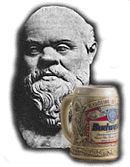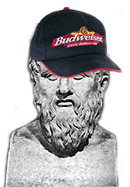Philosophy 2000?
How to Effectively Win Arguments
 For centuries, back to the times of Socrates and Plato, debating has been seen as the greatest form of intellectual prowess. Debates were once great battles in which a man could publicly prove the superiority of his thought processes. These mental melees took place in front of entire towns, as entertainment. The best debates and discussions, featuring such a notable as Socrates, who was ultimately placed on trial and killed for his strong arguments, were witnessed by the masses as important events. Even today, all the networks feature highly advertised and anticipated debates between political opponents, which may have a great effect on the outcome of the ensuing election. Richard Nixon learned the importance of debate when he lost to John F. Kennedy because of his physical poor showing.
For centuries, back to the times of Socrates and Plato, debating has been seen as the greatest form of intellectual prowess. Debates were once great battles in which a man could publicly prove the superiority of his thought processes. These mental melees took place in front of entire towns, as entertainment. The best debates and discussions, featuring such a notable as Socrates, who was ultimately placed on trial and killed for his strong arguments, were witnessed by the masses as important events. Even today, all the networks feature highly advertised and anticipated debates between political opponents, which may have a great effect on the outcome of the ensuing election. Richard Nixon learned the importance of debate when he lost to John F. Kennedy because of his physical poor showing.
When Socrates taught the young men of Athens, he changed philosophy by examining and creating patterns of logic in argument. After Socrates died, his younger associate Plato picked up where he left off. Plato's method of teaching was the dialogue, a form of argument. He felt that knowledge could only be achieved through lengthy discussion and through the formulation of questions. Plato would pose abstract arguments to show an unchanging, mathematical based reality despite the varying appearances of human senses.
From these beginnings of philosophy and modern thought, intellectual argument has flourished into an art form. A legal system consisting of advocators (lawyers), judges and juries is nothing more than regulated argument. Great arguments have taken place throughout history including one of the greatest discussions in modern educational history: creation vs. evolution. This opposition to Charles Darwin's theories of evolution occurred at Oxford in 1860. Samuel Wilberforce and Richard Owen argued the creationist's side against biologists Thomas Henry Huxley and Joseph Dalton Hooker. The evolutionists won the debate hands down and almost a century later, in 1951, Pope Pius XII issued a text that stated that Catholics could accept evolution as the formulation of the human body as long as they believed that God was responsible for the human soul.
 To shorten what could very well become a long story, argument has been around for ages as a proven and effective means to a logical end. However, little did these great orators and philosophers of the past realise that eventually most arguments would be taking place under alcoholic influence in the smoking corners of bars everywhere. With that in mind, it is necessary to amend the teachings of old and form a new chapter for the teaching of modern dialogue. The following hypothetical situations assume the presence of alcohol and a deadened wit. 1
To shorten what could very well become a long story, argument has been around for ages as a proven and effective means to a logical end. However, little did these great orators and philosophers of the past realise that eventually most arguments would be taking place under alcoholic influence in the smoking corners of bars everywhere. With that in mind, it is necessary to amend the teachings of old and form a new chapter for the teaching of modern dialogue. The following hypothetical situations assume the presence of alcohol and a deadened wit. 1
Drink Alcohol 2
Suppose you're at a party and some hotshot intellectual is expounding on the economy of Peru, a subject you know nothing about. If you're drinking some health-fanatic drink like wheat juice, you'll hang back, afraid to display your ignorance, while the hotshot enthralls your date. But if you drink several large martinis, you'll discover you have strong views about the Peruvian economy. You'll be a wealth of information. You'll argue forcefully, offering searing insights and possibly upsetting furniture. Spectators will be impressed - although some may leave the room.
Make things up 3
Suppose, in the Peruvian economy argument, you are trying to prove Peruvians are underpaid - a position you base solely on the fact that you are underpaid, and you're damned if you're going to let a bunch of Peruvians be better off. Don't say: "I think Peruvians are underpaid." Say: "The average Peruvian's salary in 1981, dollars adjusted for the revised tax base, is $1,452.81 per annum, which is $836.07 before the mean gross poverty level." (note: Always make up exact figures.) If an opponent asks you where you got your information, make that up, too. Confidently state: "This information comes from Dr. Hovel T. Moon's study for the Buford Commission published May 9, 1982. Didn't you read it?" Say this in the same tone of voice you would use to say "You left your soiled underwear in my bath house."
Use meaningless but weighty-sounding words and phrases
Memorize this list:
Let me put it this way
In terms of
Vis-à-vis
Per se
As it were
Qua
So to speak
You should also memorize some Latin abbreviations such as "Q.E.D.," "e.g.," and "i.e." These are all short for "I speak Latin and you do not." Here's how to use these words and phrases. Suppose you want to say: "Peruvians would like to order appetizers more often, but they don't have enough money." You never win arguments talking like that. But you will win if you say: "Let me put it this way. In terms of appetizers vis-à-vis Peruvians qua Peruvians, they would like to order them more often, so to speak, but they do not have enough money per se, as it were. Q.E.D." Only a fool would challenge that statement.
Use snappy and irrelevant comebacks
You need an arsenal of all-purpose irrelevant phrases to fire back at your opponents when they make valid points. The best are:
You're begging the question.
You're being defensive.
Don't compare apples and oranges.
What are your parameters?
The last one is especially valuable. Nobody, other than mathematicians, has the vaguest idea what "parameters" means. Here's how to use your comebacks: You say: "As Abraham Lincoln said in 1873..." Your opponent says: "Lincoln died in 1865." You say: "You're begging the question." or You say: "Liberians, like most Asians..." Your opponent says: "Liberia is in Africa." You say: "You're being defensive."
Compare your opponent to Saddam Hussein 4
This is your heavy artillery, for when your opponent is obviously right and you are spectacularly wrong. Bring Hussein up subtly. Say: "That sounds suspiciously like something Saddam Hussein might say" or "You certainly do remind me of Saddam Hussein."
So that's it: you now know how to out-argue anybody. Do not try to pull any of this on people who generally carry weapons.
1 Renaissance Online Magazine did not create these argument suggestions. back
2 We are in no way suggesting that a drunken existence is better than a sober one. back
3 Lying is not an accepting way to gain friends or a legal way to speak to a judge. back
4 We don't support Saddam Hussein or any of his parts. Nor should you get into a argument with Saddam Hussein, or any other crazy dictator for that matter. back
TOP

 For centuries, back to the times of Socrates and Plato, debating has been seen as the greatest form of intellectual prowess. Debates were once great battles in which a man could publicly prove the superiority of his thought processes. These mental melees took place in front of entire towns, as entertainment. The best debates and discussions, featuring such a notable as Socrates, who was ultimately placed on trial and killed for his strong arguments, were witnessed by the masses as important events. Even today, all the networks feature highly advertised and anticipated debates between political opponents, which may have a great effect on the outcome of the ensuing election. Richard Nixon learned the importance of debate when he lost to John F. Kennedy because of his physical poor showing.
For centuries, back to the times of Socrates and Plato, debating has been seen as the greatest form of intellectual prowess. Debates were once great battles in which a man could publicly prove the superiority of his thought processes. These mental melees took place in front of entire towns, as entertainment. The best debates and discussions, featuring such a notable as Socrates, who was ultimately placed on trial and killed for his strong arguments, were witnessed by the masses as important events. Even today, all the networks feature highly advertised and anticipated debates between political opponents, which may have a great effect on the outcome of the ensuing election. Richard Nixon learned the importance of debate when he lost to John F. Kennedy because of his physical poor showing.
 To shorten what could very well become a long story, argument has been around for ages as a proven and effective means to a logical end. However, little did these great orators and philosophers of the past realise that eventually most arguments would be taking place under alcoholic influence in the smoking corners of bars everywhere. With that in mind, it is necessary to amend the teachings of old and form a new chapter for the teaching of modern dialogue. The following hypothetical situations assume the presence of alcohol and a deadened
To shorten what could very well become a long story, argument has been around for ages as a proven and effective means to a logical end. However, little did these great orators and philosophers of the past realise that eventually most arguments would be taking place under alcoholic influence in the smoking corners of bars everywhere. With that in mind, it is necessary to amend the teachings of old and form a new chapter for the teaching of modern dialogue. The following hypothetical situations assume the presence of alcohol and a deadened